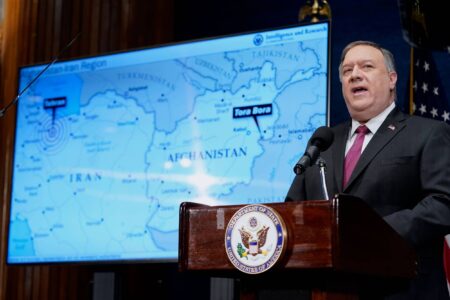
How Iran serves as a key geographic hub for Al-Qaeda terrorists?
Mike Pompeo, the outgoing US secretary of state, made a splash last week when he unveiled new intelligence pointing to an enduring operational relationship between the regime in Iran and Al-Qaeda’s international terror network.
Although senior Al-Qaeda operatives are long known for using Iran as a transit point and shelter, what many policymakers and the general public have failed to grasp is just how vital the safe haven offered by the Islamic Republic has become to Al-Qaeda’s survival.
Iran is now officially the last government in the world that knowingly harbors and facilitates Al-Qaeda activity. Revelations concerning the full extent of this nexus come as Iran accelerates its drive towards nuclear-weapons capability with threats and warnings that are a belated wake-up call for world leaders.
The Islamic Revolutionary Guard Corps (IRGC)’s extraterritorial Quds Force has worked behind the scenes as a driver of both Tehran’s illicit nuclear program and its facilitation of the terrorist activities of senior Al-Qaeda leaders who have sought refuge in Iran.
Concurrently, the Quds Force has used the threat of Al-Qaeda as a justification for the expansion of its Shiite militia proxies in Syria and Iraq. In reality of course, key figures in Al-Qaeda’s central command have been traveling to Syria and establishing a foothold there with the connivance of their Quds Force patrons.
Anyone in search of proof need look no further than the sanctuary provided by Iran to Al-Qaeda’s chief military strategist Saif Al-Adel, who masterminded the 2003 bombings of residential compounds in Riyadh, killing 39 and injuring 160.
Al-Adel, whose real name is believed to be Mohammed Salah Al-Din Zaidan, has emerged as a key emissary for Al-Qaeda’s operations in Syria and has even traveled there from Iran.
Other senior Al-Qaeda operatives who were based in Iran before traveling to Syria include Muhsin Al-Fadhli, a former leader the group’s Iran-based facilitation network, and Sanafi Al-Nasr, a senior operative who was given free rein to continue terrorist activities under the watchful eye of the Iranian government.
Against this backdrop, the Trump administration’s focus in its waning days on Iran’s emergence as a major Al-Qaeda hub is significant on several counts.
Above all, it intimates that the US and its allies can no longer turn a blind eye to the Iranian regime’s complicity in Al-Qaeda activity, something that was politically convenient for them to do during their efforts to establish a nuclear deal at any cost.
The offer of a $7 million reward by Pompeo for information leading to the capture or killing of Abd Al-Rahman Al-Maghrebi, the son-in-law and senior advisor to Al-Qaeda leader Ayman al-Zawahiri and commander of Al-Qaeda’s operations from Tehran, is a strong indicator of this new awareness.
Given that the incoming Biden administration will be composed of Obama-era officials who were involved in negotiating the 2015 nuclear accord with Iran (also known as JCPOA), a push to link sanctions on Iran to its continued support for Al-Qaeda (in addition to its stepped-up nuclear program) could offer US policymakers greater leverage.
“The relationship between Iran and Al-Qaeda has long been understated if not ignored in Washington,” Richard Goldberg, former Director for Countering Iranian Weapons of Mass Destruction in the Trump White House, told Arab News.
“Putting a bounty on the head of a top Al-Qaeda operative living in Iran forces the incoming Biden administration to confront Iran’s sponsorship of terrorism across the spectrum. There’s no more hiding this dangerous relationship.”
Source: Arab News





